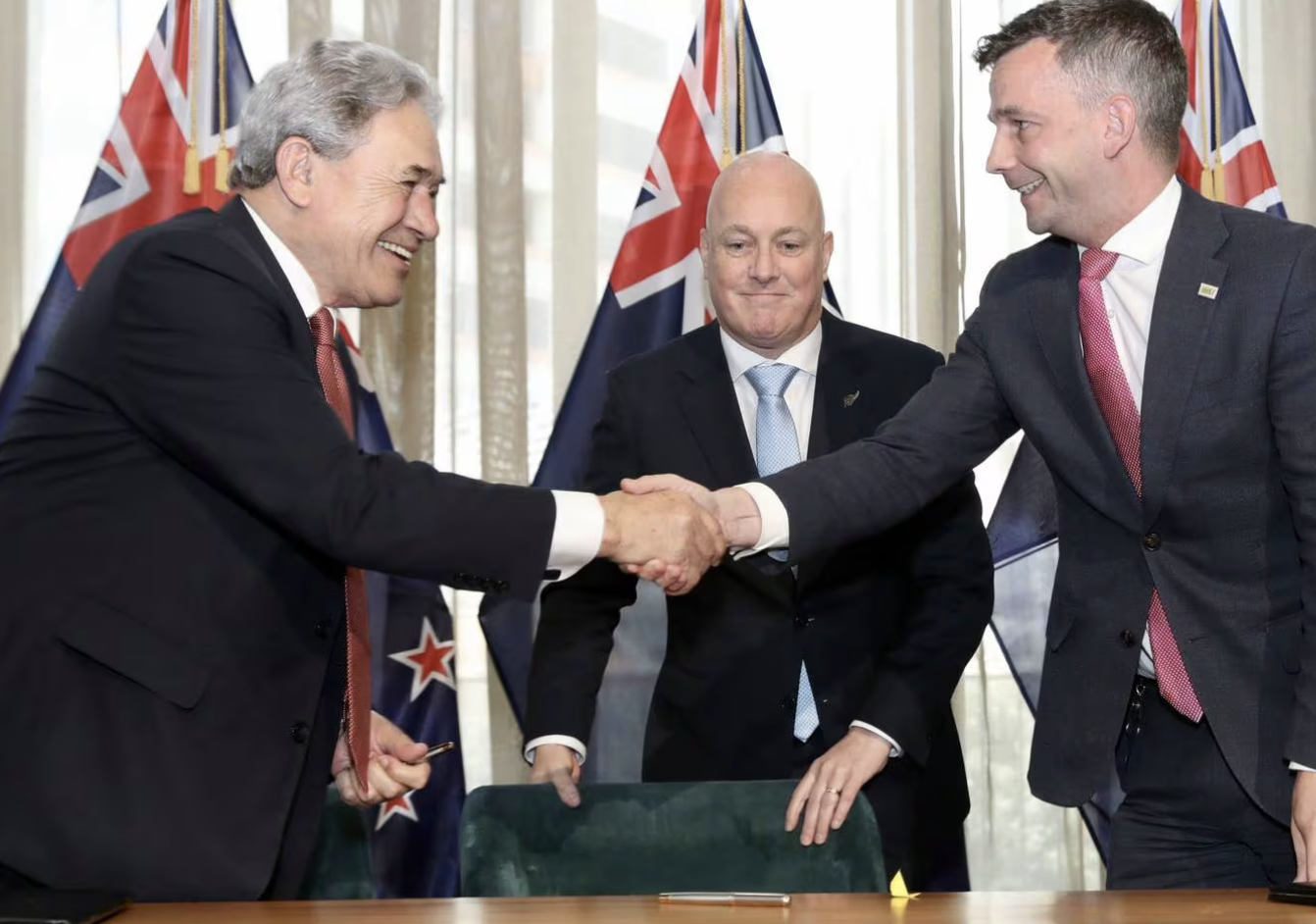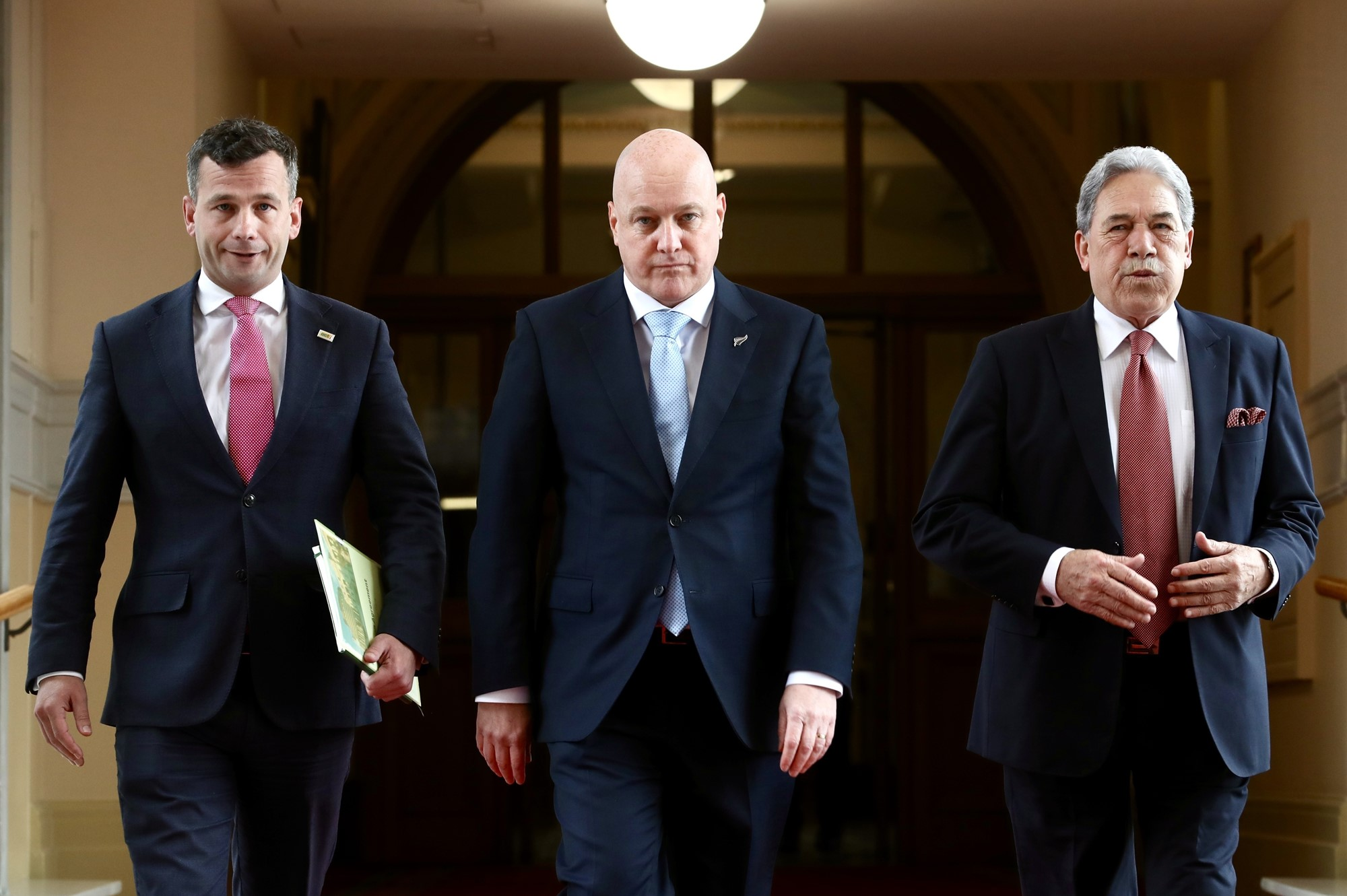Winston Peters and David Seymour will share the role of Deputy Prime Minister for the first time in New Zealand’s political history.
In a highly unorthodox arrangement, Peters, 78, will take the deputy role for the next 18 months. He will then be replaced by 40-year-old Seymour, the leader of Act, for the second half of the coalition government’s three-year term.
The New Zealand First leader has also snared the coveted role of Foreign Affairs Minister – a role Peters has filled in previous administrations.
Prime Minister Christopher Luxon this morning unveiled the Cabinet line-up at Parliament. There are 20 ministers including 14 from his party, National, as well as three from Act and three from NZ First.
Seymour will become the Minister for Regulation. National's Nicola Willis will be Minister of Finance, Act's Brooke van Velden will be Minister for Workplace Relations and Safety and Shane Jones from NZ First will be Minister for Regional Development.
There will be five ministers from National, two from ACT and one from New Zealand First outside Cabinet.
Act and NZ First will each have one Parliamentary Under-Secretary.
Senior National MP Gerry Brownlee has been appointed Speaker of the House.

The centre-right National Party won the largest share of votes in the October 14 poll but needed the support of both right-wing Act and populist NZ First parties.
"We believe in this country, we are ambitious for it and we know that with the right leadership, the right policies, and the right direction, together we New Zealanders can make this an even better country," Luxon said in today's speech ahead of the formal signing of the agreement at Parliament.
The 53-year-old former chief executive of Air New Zealand became leader of National at the end of 2021 and is credited with boosting its popularity ahead of winning the election.
The coalition today revealed a series of policy changes it will undertake in government.
Focus on economy
Luxon said the new government “will manage a strong economy that will ease the cost of living and deliver tax relief, restore law and order, deliver better public services and strengthen democracy”.
The parties said they plan to "re-write the Arms Act" without giving any further details, and would undertake a review of the gun registry introduced after a gunman killed 51 Muslim worshippers at two Christchurch mosques in 2019. It also agreed to train no fewer than 500 new police.
In one high-profile coalition deal casualty, National has abandoned its policy to repeal the foreign buyers residential property ban - that is a significant win for Peters.
“Delivering tax relief is just one part of the Government’s plan to rebuild the economy. The Government will ease the cost of living, reduce wasteful spending, and lift economic growth to increase opportunities and prosperity for all New Zealanders,” Luxon said.
Luxon said the Government would narrow the remit of the central bank, amending the Reserve Bank of New Zealand Act 2021 to remove the dual mandate on inflation and employment, to focus monetary policy only on price stability.
The coalition planned to repeal a ban on offshore oil and gas exploration and a ban on the sale of cigarettes to future generations introduced by the previous Labour government, according to coalition documents.
The new government would cut personal income taxes following through on a campaign policy used to woo middle income voters struggling with rising costs of living.
Luxon said tax cuts were scheduled to kick in from July 1 next year.
“The tax package will continue to be funded through a combination of spending reprioritisation and additional revenue measures. However, as part of National’s agreement with New Zealand First, the proposed foreign buyer tax will no longer go ahead.
"Policy changes will help offset the loss of revenue from that change. National’s fiscal plan also had buffers which give confidence that tax reduction can still be funded responsibly."
The National-Act agreement says: "The parties have agreed to no ongoing commitment to income tax changes, including threshold adjustments, beyond those to be delivered in 2024."
It adds: "“The coalition parties have adopted ACT’s policy to speed up the rate at which interest deductibility for rental properties is restored ."That is a commitment to restore mortgage interest deductibility for rental properties with a 60 per cent deduction in 2023/24, 80 per cent in 2024/25, and 100 per cent in 2025/26.
The National-Act agreement also says that the concepts of Act's income tax policy "are considered as a pathway to delivering National’s promised tax relief, subject to no earner being worse off than they would be under National’s plan."

Treaty of Waitangi
The new government has agreed to proceed with the Act party's policy to address principles of the Treaty of Waitangi.
The agreement includes a pledge to introduce a Treaty Principles Bill based on existing Act policy and support it to a Select Committee “as soon as practicable”.
It does not mention a public referendum on the matter, as Act had proposed.
The agreement also includes pledges to remove co-governance from the delivery of public services, as all three parties had campaigned, along with instruction that public services be provided on the basis of need rather than race.
Other policies include restoring referendum requirements to introduce Māori wards and repealing the Canterbury Regional Council (Ngāi Tahu Representation) Act 2022.
Mixed bag
The new Cabinet, which will be sworn in on Monday, is a combination of veteran politicians and new leaders.
Peters - a colourful, populist figure - will be taking over as foreign minister for a third time after serving in the role in Dame Jacinda Ardern's 2017 Labour-led government under and with Labour Prime Minister Helen Clark in 2005.
"Foreign affairs does matter to this country.... all relationships do matter to this country," Peters said in a joint news conference in Wellington after today's announcement.
"We expect the Chinese government to treat us the same way, regardless of our size, as we treat Niue. Size doesn't matter, respect does," he said when asked how he plans to deal with China's growing influence in the region.
Luxon said he wanted to have a swearing-in ceremony for ministers on Monday.
Rehearsals for the state opening of Parliament took place there yesterday. Luxon said he wanted Parliament open by December 5, allowing three weeks of sitting time before the House rises for Christmas.
Act leader David Seymour told The New Zealand Herald the Government would announce a 100-day plan soon, hinting some of this would include repealing legislation, potentially under urgency.
“There may well be some things where the existence of legislation that we no longer want to exist and that is costing a large amount of money and therefore, it actually requires urgency to stop that waste.”
- NZ Herald and Reuters












